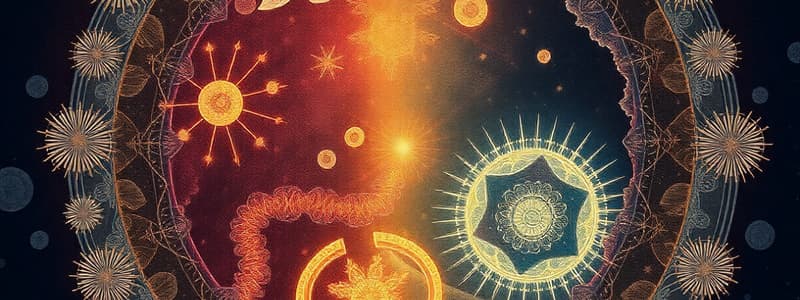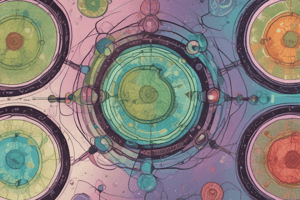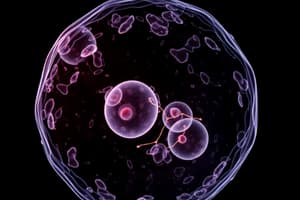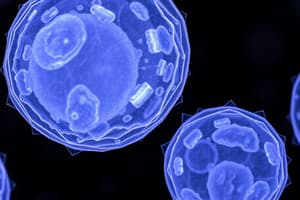Podcast
Questions and Answers
What occurs during the S phase of the cell cycle?
What occurs during the S phase of the cell cycle?
Which statement accurately describes the G2 phase of the cell cycle?
Which statement accurately describes the G2 phase of the cell cycle?
What is the primary role of the checkpoint in the middle of mitosis?
What is the primary role of the checkpoint in the middle of mitosis?
How long does interphase constitute in the cell cycle?
How long does interphase constitute in the cell cycle?
Signup and view all the answers
During which phase does the cell focus energy on preparing for division and stop growing?
During which phase does the cell focus energy on preparing for division and stop growing?
Signup and view all the answers
What are the two basic functions of the cell cycle?
What are the two basic functions of the cell cycle?
Signup and view all the answers
In which phase of the cell cycle does the cell grow and copy chromosomes in preparation for division?
In which phase of the cell cycle does the cell grow and copy chromosomes in preparation for division?
Signup and view all the answers
Why is cell division crucial for multicellular organisms?
Why is cell division crucial for multicellular organisms?
Signup and view all the answers
Which cells in the human body typically do not undergo division?
Which cells in the human body typically do not undergo division?
Signup and view all the answers
What phase directly follows the G1 phase in the cell cycle?
What phase directly follows the G1 phase in the cell cycle?
Signup and view all the answers
What term describes the resting phase where the cell has exited the cycle and is not dividing?
What term describes the resting phase where the cell has exited the cycle and is not dividing?
Signup and view all the answers
What is the main event that occurs during the M phase of the cell cycle?
What is the main event that occurs during the M phase of the cell cycle?
Signup and view all the answers
Which component is distributed evenly to the daughter cells during cell division?
Which component is distributed evenly to the daughter cells during cell division?
Signup and view all the answers
What characterizes the G1 phase of the cell cycle?
What characterizes the G1 phase of the cell cycle?
Signup and view all the answers
In what direction does DNA replication proceed?
In what direction does DNA replication proceed?
Signup and view all the answers
What is a requirement for the initiation of DNA replication?
What is a requirement for the initiation of DNA replication?
Signup and view all the answers
What type of process is DNA replication characterized as?
What type of process is DNA replication characterized as?
Signup and view all the answers
Which feature is NOT characteristic of DNA replication?
Which feature is NOT characteristic of DNA replication?
Signup and view all the answers
What are duplicated chromosomes held together by after DNA replication?
What are duplicated chromosomes held together by after DNA replication?
Signup and view all the answers
Which statement accurately describes the nature of the S-phase?
Which statement accurately describes the nature of the S-phase?
Signup and view all the answers
What ultimately results from the process of DNA replication?
What ultimately results from the process of DNA replication?
Signup and view all the answers
What role do cyclins play in the cell cycle?
What role do cyclins play in the cell cycle?
Signup and view all the answers
Which of the following statements about cancer cells is true?
Which of the following statements about cancer cells is true?
Signup and view all the answers
What is the primary function of Maturation Promoting Factor (MPF)?
What is the primary function of Maturation Promoting Factor (MPF)?
Signup and view all the answers
Which cyclin is paired with Cdk4 in the G1 phase?
Which cyclin is paired with Cdk4 in the G1 phase?
Signup and view all the answers
Which of the following is NOT a characteristic of the cell cycle?
Which of the following is NOT a characteristic of the cell cycle?
Signup and view all the answers
What is the role of cyclin-dependent kinases (cdks) in cell cycle regulation?
What is the role of cyclin-dependent kinases (cdks) in cell cycle regulation?
Signup and view all the answers
What happens during the G1 checkpoint in the cell cycle?
What happens during the G1 checkpoint in the cell cycle?
Signup and view all the answers
Which statement best describes the relationship between cyclins and cdks?
Which statement best describes the relationship between cyclins and cdks?
Signup and view all the answers
What is the primary function of the kinetochore during cell division?
What is the primary function of the kinetochore during cell division?
Signup and view all the answers
Which phase of the cell cycle is characterized by the synthesis of cell structures needed for division?
Which phase of the cell cycle is characterized by the synthesis of cell structures needed for division?
Signup and view all the answers
What occurs during the metaphase of mitosis?
What occurs during the metaphase of mitosis?
Signup and view all the answers
What significant role does the centrosome play in cell division?
What significant role does the centrosome play in cell division?
Signup and view all the answers
In which phase do the sister chromatids become individual chromosomes?
In which phase do the sister chromatids become individual chromosomes?
Signup and view all the answers
What is the main purpose of the cell cycle control system?
What is the main purpose of the cell cycle control system?
Signup and view all the answers
Which structure forms during telophase to enclose the chromosome sets?
Which structure forms during telophase to enclose the chromosome sets?
Signup and view all the answers
What is the result of cytokinesis in the cell cycle?
What is the result of cytokinesis in the cell cycle?
Signup and view all the answers
During which phase of mitosis do spindle fibers attach to kinetochores?
During which phase of mitosis do spindle fibers attach to kinetochores?
Signup and view all the answers
Which of the following statements about daughter cells formed after mitosis is correct?
Which of the following statements about daughter cells formed after mitosis is correct?
Signup and view all the answers
What role do positive cues play in the cell cycle?
What role do positive cues play in the cell cycle?
Signup and view all the answers
At which checkpoint does the cell cycle predominantly assess DNA integrity before moving to division?
At which checkpoint does the cell cycle predominantly assess DNA integrity before moving to division?
Signup and view all the answers
Which of the following phases is characterized by the nuclear envelope breaking down?
Which of the following phases is characterized by the nuclear envelope breaking down?
Signup and view all the answers
What is primarily regulated by Cdks and cyclins during the cell cycle?
What is primarily regulated by Cdks and cyclins during the cell cycle?
Signup and view all the answers
Which component is NOT directly responsible for the regulatory processes of the cell cycle?
Which component is NOT directly responsible for the regulatory processes of the cell cycle?
Signup and view all the answers
Which transition is specifically influenced by negative cues such as DNA damage?
Which transition is specifically influenced by negative cues such as DNA damage?
Signup and view all the answers
Which molecule primarily acts as a kinase to promote cell cycle progression?
Which molecule primarily acts as a kinase to promote cell cycle progression?
Signup and view all the answers
During which phase is DNA replicated in the cell cycle?
During which phase is DNA replicated in the cell cycle?
Signup and view all the answers
Study Notes
The Cell Cycle and Its Control
- Cells are derived from pre-existing cells
- Cell cycle: an ordered sequence of events in a cell preparing for division
- Function of cell cycle: copying cellular components and DNA duplication, dividing the cell into daughter cells with even distribution of components.
- Cell division is a crucial part of the cell cycle
- Cell division occurs in unicellular organisms for reproduction
- In multicellular organisms, cell division is for growth, creating new cells, and repairing existing ones (e.g., liver, skin)
- Not all cells can divide, some cells like nerve cells, heart cells, and eye lens cells are maintained throughout adult life
Stages of the Cell Cycle
- Interphase (about 90% of the cell cycle):
- G1 phase: cell growth, normal cell function, organelle duplication, protein synthesis, preparing for DNA replication, making proteins to duplicate the cellular components and DNA
- S phase: DNA replication, chromosomes duplicate, forming sister chromatids connected by the centromere
- G2 phase: final growth phase, preparing for mitosis (cell division). synthesizing cellular components (cytoplasm and organelles) needed for division
- Mitosis: process of nuclear division
- Prophase: preparation for chromosome separation
- Prometaphase: breakdown of nuclear membrane and nucleolus, chromosomes condense, and spindle fibers form connecting to centromeres
- Metaphase: chromosomes align in the middle (metaphase plate)
- Anaphase: sister chromatids separate and move to opposite poles of the cell, pulled by spindle fibers attached to kinetochores
- Telophase: nuclear envelopes form around each set of chromatids at opposite poles, chromosomes decondense, nucleolus reappears, spindle fibers disappear
- Cytokinesis: division of the cytoplasm, creating two daughter cells
DNA Replication
- DNA replication: a semi-conservative process where DNA strands serve as templates for new strands, with each new DNA molecule consisting of one original and one new strand, creating identical DNA strands.
- Base pairing allows each strand to serve as a template for a new strand.
- Involved in several enzymes and proteins (Replisome)
- Semiconservative: Watson and Crick base pairing maintained
- 5' to 3' direction of synthesis
- Initiation involves a primer, a complex process involving several enzymes and proteins (Replisome)
Cell Cycle Control System
- The sequential events of the cell cycle are directed by a distinct cell cycle control system.
- The system is similar to a clock.
- The cell cycle control system is regulated by both internal and external controls.
- The clock has specific checkpoints where the cycle stops until a go-ahead signal is received.
Checkpoints in the Cell Cycle
- G1 checkpoint (restriction point): makes decision to divide or not based on conditions and also checks if DNA is damaged. If DNA is damaged then it does not proceed to division.
- G2 checkpoint: determines if DNA replication has occurred correctly or if there was any damage. If conditions are not favourable the cells stop division
- Metaphase checkpoint: ensures that all kinetochores are attached to the microtubules of the mitotic spindle before sister chromatids separate. It ensures that all of the chromosomes are properly attached to spindles before being divided.
Molecules Involved in Cell Cycle Control
- Cyclins: proteins that activate cyclin-dependent kinases (Cdks). Their concentrations fluctuate cyclically throughout the cell cycle.
- Cyclin-dependent kinases (Cdks): enzymes that drive cell cycle events, activated by cyclins.
Maturation Promoting Factor (MPF)
- Heterodimeric protein composed of cyclin B & cyclin-dependent kinase (CDK1)
- Promotes entrance into mitosis (M phase) from G2 phase.
- Phosphorylates multiple proteins needed during mitosis.
Cancer Cells and Cell Cycle Control
- Cancer cells do not respond normally to the body's control mechanisms.
- They may not need growth factors to grow and divide or may have an abnormal cell cycle control system. This can lead to uncontrolled cell growth, which is a characteristic of cancer.
Studying That Suits You
Use AI to generate personalized quizzes and flashcards to suit your learning preferences.
Related Documents
Description
Test your knowledge about the various phases of the cell cycle, including interphase and mitosis. This quiz covers key functions, roles, and events that occur during each phase, from the G1 phase through to cell division. Perfect for biology students looking to reinforce their understanding of cell biology.




